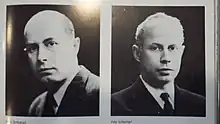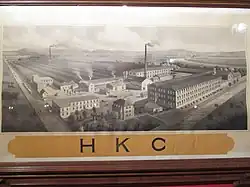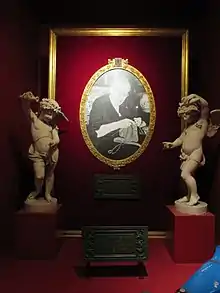Hans and Fritz Schlumpf | |
|---|---|
 Schlumpf Brothers, 1950s | |
| Born |
|
| Died |
|
| Nationality | Swiss |
| Occupation(s) | Industrialists, automobile collectors |
| Known for | Founding Schlumpf Collection |
Giovanni Carlo Vittorio Schlumpf known as Hans Schlumpf (February 21, 1904 - January 1, 1989)[1] and Federico Filippo Augustino Schlumpf known as Fritz Schlumpf (February 24, 1906 - April 18, 1992)[2] more prominently known as Schlumpf Brothers were Italian-born Swiss textile industrialists, automobile collectors and convicted fraudsters. They are best known for founding the Schlumpf Collection currently housed in Musée National de l'Automobile de Mulhouse.
The Schlumpf Collection which was founded and developed between 1935 and 1976 belongs to the world's most important private automobile collections with over 560 automobiles of various luxury and sports car makes, most prominently 123 Bugattis and 14 Rolls-Royces.[3] 430 of those automobiles are classified as historically protected. The Schlumpf brothers financed their collection by bankrupting their company and to avoid charges they fled to Switzerland where they remained in exile until their death, since Swiss citizens will not be extradited to foreign jurisdictions.[4][5][6]
Early lives and education
The Schlumpf brothers were both born in Omegna, Piedmont near Milan. They were the only sons of textile industrialist Carl Schlumpf[7] and Alsatian Jeanne Becker.[8] Carl worked in the horticultural company of his in-laws when they initially met. His textile endeavors brought the family to the Kingdom of Italy but they returned to Mulhouse, France (then in the German Empire) in 1908. The Schlumpf brothers were citizens of Switzerland by birth. Hans attended a private school in his fathers homeland and worked for two banks before entering business with his brother in 1929. Fritz attended and graduated from public high school in Mulhouse. He then started to work in the textile industry and became a wool broker in 1928.[9][10]
Career

After engaging in wool brokerage, the brothers decide to go into finance and participations, in order to grow their business. Fritz Schlumpf can be seen as the initiator and leader of the two. They began to speculate in various industries and made large profits. At the end of the Great Depression of 1929, they were among the French monetary elite. In 1935, they founded SAIL (Société Anonyme pour l'Industrie Lainière), a public company trading in wool. They started buying up several textile manufacturing plants, most prominently a spinning mill in Malmerspach in 1957, about 20 miles (or 30 kilometers) Northwest from Mulhouse (formerly Eck, Guth & Cie.), which was owned by a Jewish family who faced persecution during World War II. Until its bankruptcy and dissolution 1977, this spinning mills employed over 3,000 workers and was the most important employer of the region.[11][12] SAIL became a mayor textile concern which basically held a quasi-monopoly in Eastern France and grew steadily until the textile crisis of the 1970s.[13] They were also diversified in wine estates in the Champagne region and real estate.
Schlumpf Affair and Collection

Fritz Schlumpf acquired his first Bugatti aged 22 as young, successful wool broker in 1928. He regularly participated in motorsport events and had a passion for the technique of automobiles. He became close to the Bugatti brand which was located in nearby Molsheim. After World War II Fritz and Hans Schlumpf gathered an enormous collection of classic automobiles, including several hundred Bugattis (many of them in pieces or unrestored, but many were also completed cars).
To fund this hobby they encumbered their enterprise to such an extent that by 1977 it became insolvent. Until this time the automobile collection was unknown to the public, but the excesses were revealed in 1977 during a strike by the former Schlumpf textile workers.[14] On February 10, 1977, the French Justice System issued an arrest warrant against the former industrialists and owners of textile factories in Malmerspach, Mulhouse (HKC), Erstein and Roubaix. The Schlumpf Collection which was then valued at 100 million French francs (or 50 million Swiss francs) was provisionally seized by authorities. At this time, the Schlumpf brothers, already entered Switzerland on their Swiss passports, avoiding persecution.[15] On March 23, 1983, both brothers were sentenced to prison terms of two respectively four years due to fraudulent bankruptcy and embezzlement.[16] In 1988, the sentence was confirmed by the High Courts of Mulhouse in France.[17]
Personal life
Until 1977, the brothers, who both remained unmarried and without heirs, resided in their estate in Malmerspach. After the dissolution of their business and French authorities charging them with fraudulent bankruptcy, they fled France to avoid persecution. They settled in Basel and died in exile aged 84 respectively 86.[18]
Literature
- Jenkinson, Denis; Verstappen, Peter (1978). The Schlumpf Obsession. Book Club Associates. ISBN 0600383121.
- op de Weegh, Ard; op de Weegh, Arnoud (December 2017). Schlumpf: de affaire achter de mooiste autocollectie ter wereld. The Netherlands: Alk B.V., Uitgeverij de. ISBN 9789059611894.
References
- ↑ Death announcement https://www.e-newspaperarchives.ch/?a=d&d=NZZ19890106-01.2.13.4&srpos=4&e=-------de-20--1--img-txIN-Hans+Schlumpf-------0-----
- ↑ Death announcement https://www.e-newspaperarchives.ch/?a=d&d=NZZ19920423-01.2.19.3&srpos=2&e=-------de-20--1--img-txIN-Fritz+Schlumpf+gestorben-------0-----
- ↑ Dossier de Presse, 2012 (in French) https://citedelautomobile.com/sites/cda/files/dp_cda_2012.pdf
- ↑ "The Schlumpf Collection, a Passion for Automobiles | Gazette Drouot". gazette-drouot.com. 2022-06-16. Retrieved 2023-04-26.
- ↑ "the Bugatti revue, 13-5, Malmerspach Collection". www.bugattirevue.com. Retrieved 2023-04-26.
- ↑ 'Schlumpf affair' Bankruptcy https://www.e-newspaperarchives.ch/?a=d&d=NZZ19770303-01.2.11.7&srpos=1&e=-------de-20--1--img-txIN-Gebr%c3%bcder+Schlumpf-------0-----
- ↑ Obituary of Carl Schlumpf-Becker (1871-1918) https://www.e-newspaperarchives.ch/?a=d&d=NZZ19180826-01.2.10.1&srpos=1&e=------191-de-20--1--img-txIN-Schlumpf%252DBecker-------0-----
- ↑ History of the Becker family (genealogy) https://www.alsace-histoire.org/netdba/becker/
- ↑ "History Schlumpf". Musée National de l'Automobile. Retrieved 2023-04-26.
- ↑ "Bio: Schlumpf Brothers". Supercar Nostalgia. Retrieved 2023-04-26.
- ↑ "Filature de laine peignée Eck, Guth et Cie, à Malmerspach". www.europeana.eu (in Maltese). Retrieved 2023-04-26.
- ↑ Alsace (2016-06-09). "Musée National de l'Automobile * Mulhouse". Alsace et Moi (in French). Retrieved 2023-04-26.
- ↑ Kierse, Matthias (2020-04-17). "Bugatti - Start of the Schlumpf Collection". Secret Classics. Retrieved 2023-04-26.
- ↑ Blickpunkt - Fabrikversteigerung - Play SRF (in German), retrieved 2023-04-26
- ↑ Arrest Warrants issued by French authorities, February 10, 1977 (In German) https://www.e-newspaperarchives.ch/?a=d&d=NZZ19770211-01.2.11.2&srpos=1&e=-------de-20--1--img-txIN-Aff%c3%a4re+Schlumpf-------0-----
- ↑ "Neue Zürcher Nachrichten 26. März 1983 — e-newspaperarchives.ch". www.e-newspaperarchives.ch (in German). Retrieved 2023-04-26.
- ↑ "Walliser Bote 23. September 1988 — e-newspaperarchives.ch". www.e-newspaperarchives.ch (in German). Retrieved 2023-04-26.
- ↑ "Demeure de maître et son parc arboré". Espaces Atypiques (in French). Retrieved 2023-04-26.